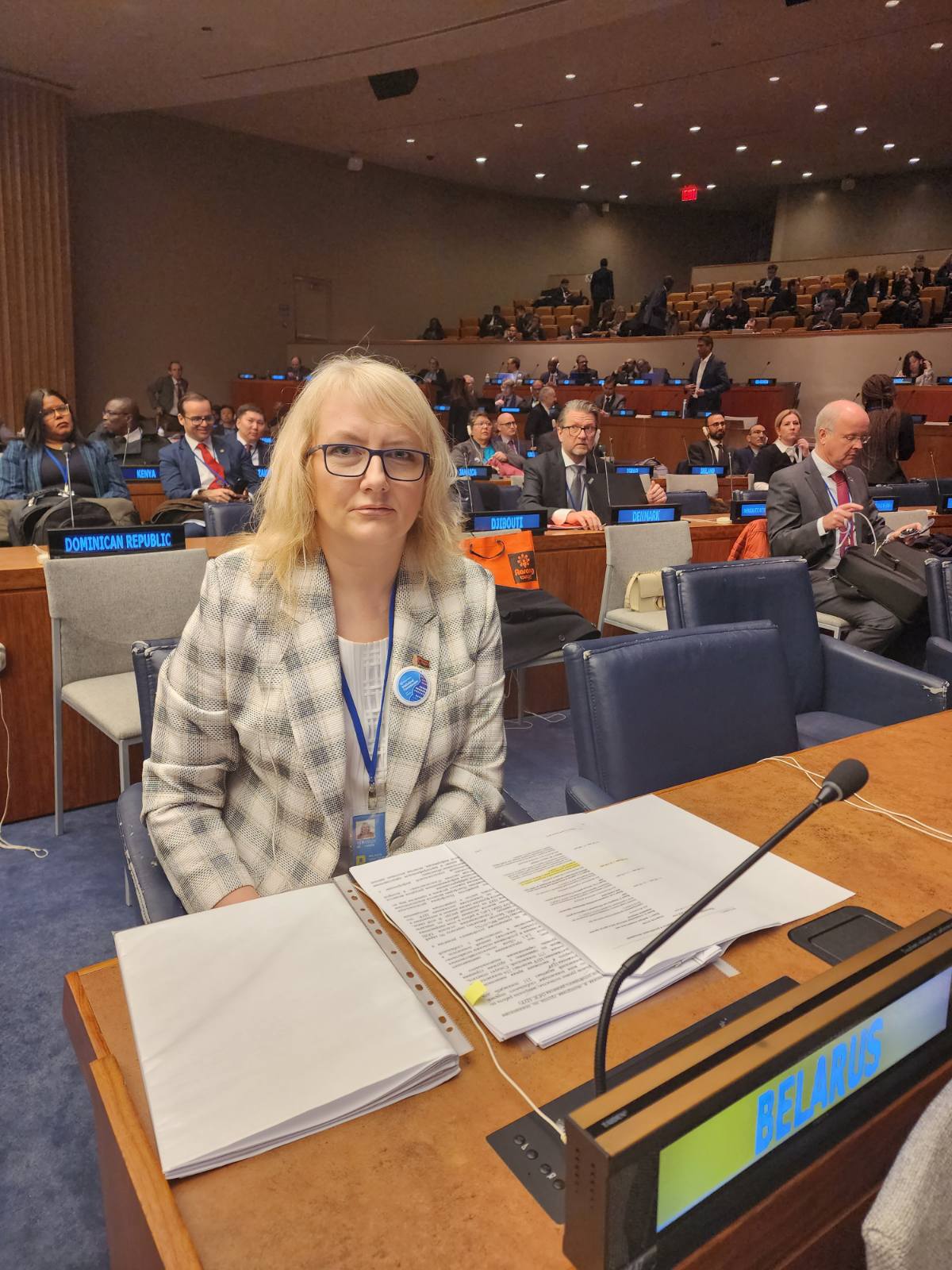
The development of data and indicators for the 2030 Agenda for Sustainable Development, economic and social statistics, climate change statistics, the System of National Accounts, international statistical classifications, population and housing censuses, open data and a number of other issues were considered at the 55th session of the United Nations Statistical Commission (27 February – 1 March 2024, New York, United States of America). Natallia Tarasiuk, Deputy Chairperson of Belstat, took part in the event on behalf of the Belarusian side.
1. As part of the discussion of the Report of the Interagency and Expert Group on Sustainable Development Goal Indicators (IAEG-SDG), the participants learnt about the methodological review of the SDG indicator framework and tier classification updates, criteria and submission requirements for the planned 2025 comprehensive review of the global indicator framework, work on the SDMX implementation, integration of geospatial and statistical data, and sustainable tourism.
Presenting the country's position on these issues, Natallia Tarasiuk praised the work carried out by the IAEG-SDGs on the methodological review of the global indicator system and updating their tier classification, and shared the achievements of Belstat in the development of the national SDG monitoring system. In the Republic of Belarus, the national list of SDG indicators currently includes 254 indicators, of which 175 (almost 70 per cent) correspond to global indicators. It should be noted that, compared to other countries, Belarus has a high level of harmonisation of the national list with the global indicator framework. The availability of data on sustainable development indicators in the Republic of Belarus is more than 90%.
Using the international SDMX standard, Belstat has ensured the transfer of 90 dataset series to the SDG Lab established by the United Nations Statistics Division, and the work in this direction continues. At the same time, active work is underway to transfer metadata on SDG indicators to the SDG Lab.
The Deputy Chairperson of Belstat highlighted important achievements of Belarusian statistics in monitoring progress towards the SDGs, in particular, the creation of the Regional Sustainable Development Data Platform and the Geostatistics information and analytical system which allowed for the integration of statistical and geospatial information.
In her intervention on this topic, Natallia Tarasiuk emphasised that the comprehensive review of the global indicator framework planned for 2025 should strictly comply with the United Nations General Assembly Resolution (A/RES/71/313), according to which the activities in respect of the Sustainable Development Goals and targets and their review should be carried out using the IAEG-SDGs global indicator framework, and should base on data produced by national statistical systems.
However, even when the national methodology for collecting and calculating SDG indicators is consistent with the global one, custodian agencies do not always use national data, but apply expert assessments and correction factors. "The lack of transparency in the approaches to calculating SDG indicators by international organisations leads to lengthy negotiations and consultations with custodian agencies and significantly hampers the data validation process," said the Deputy Chairperson.
In this regard, an important task for custodian agencies should be the development of questionnaires for national statistical offices that would ensure clear understanding of how the source data are collected, as well as clear methodology for calculating the total values.
2. Aspects such as the implementation of the 2020 World Population and Housing Census Programme and lessons learned, the impact of the coronavirus disease (COVID-19), the potential direction of the 2030 World Population Census Programme, and the ongoing revision of the Principles and Recommendations for Population and Housing Censuses for the 2030 round were discussed.
Natallia Tarasiuk spoke about national approaches to the organisation of the 2019 Population and Housing Census and the evaluation of its results. "The Population Census of the Republic of Belarus was conducted in 2019 before the COVID-19 outbreak, which did not cause negative impact on the census, including increased costs and postponement of activities," the Deputy Chairperson clarified. She also noted that in order to assess the completeness and correctness of population registration, a post-enumeration survey was conducted by means of control rounds of 10 per cent of addresses, and demographic analysis methods were applied (calculation of Whipple’s index and Myers’ index).
The Deputy Chairperson praised the work of the United Nations Statistics Division in developing the Principles and Recommendations for Population and Housing Censuses. "Belstat is closely following the changes in methodological approaches to conducting population censuses, as well as new opportunities for using modern technologies and alternative data sources," she noted in her speech.
3. At the session devoted to the consideration of the Report of the Committee of Experts on International Statistical Classifications Belarus representative voiced Belstat’s position on the Committee's recommendation to establish a five-year cycle of revision of the International Standard Industrial Classification of All Economic Activities and the Central Product Classification and the timeframe for their implementation in countries (until 2027).
Natallia Tarasiuk emphasised that national classifications of economic activities and products are used not only in statistics, but also in different spheres of economy. Therefore, the processes of development and implementation of their versions require more time taking into account the need to adjust legislation and agree classifications with users, lack of new versions of classifications and manuals in Russian. "For the cycle of revision of classifications we consider acceptable a ten-year cycle with the possibility of dynamic updates of classifications without changing the structure of sections and divisions between revisions," underscored the Deputy Chairperson.
During the 55th session of the United Nations Statistical Commission, a number of strategic decisions were taken on various areas of statistical work, and a zerodraft resolution on an inclusive and representative Statistical Commission was tentatively approved.

© National Statistical Committee of the Republic of Belarus. When using information reference to the National Statistical Committee of the Republic of Belarus is mandatory.
